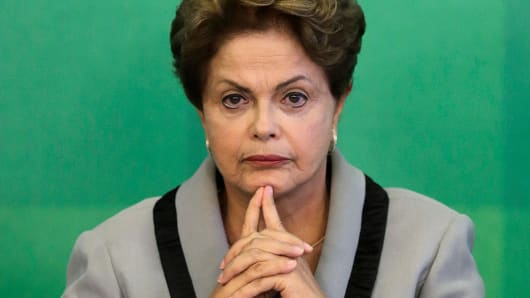In Latin America, growing scandals over corruption and conflicts of interest suggest its institutions leave much to be desired. Brazilian President Dilma Rousseff's statement that she will do "whatever it takes" to meet the government's budget target is to be welcomed in a country that is suffering a harsh economic deterioration. Like Rousseff, Latin American leaders will have to work harder to bring institutions up to standard — or face calls from voters and markets to step aside.
First, the scandals. Brazil's oil sector is grappling with corruption allegations of little historical precedent. Infiltration of organized crime in Mexico's local police forces and controversies surrounding the highest levels of government have tarnished the country's image as a model reformer. Argentina is still reeling after its recent default. Consumer goods companies are expropriated daily in Venezuela, and many owners jailed, as the country struggles with massive shortages. Caracas mayor and opposition member Antonio Ledezma has also been jailed and accused of being involved in an alleged U.S.-backed coup. The number of cabinet ministers sacked in Peru has risen to over 50 in less than five years. This week, the country's prime minister became the most recent victim. Even Chile, a Latin American institutional role model, has suffered controversy amid allegations that President Michelle Bachelet's son used his influence to get his wife a $10 million loan for a real-estate deal.
Read MoreRousseff declares war on corruption
Perception of Latin America's institutions is deteriorating. AmericasBarometer data show that in 2014, local trust in courts and in the justice system decreased to its lowest point in the past decade, with trust in local governments at its lowest since 2004. It is no coincidence institutions are declining in commodity-rich Latin America at a time of lower commodity prices and slower economic activity. We expect the region to grow by just 0.4 percent this year, roughly a sixth of the U.S. growth rate and a twentieth of China's. We also expect it to underperform in 2016 as commodity prices remain subdued and global interest rates rise. But poor rule of law, impunity, and lack of transparency threaten to create a vicious circle by undermining business confidence and potential for structural reforms.
The clearest example is Brazil. The country was already under intense market and economic pressure. But since the corruption scandal erupted in November, the equity market has lost close to 20 percent in U.S. dollar terms, gaps between U.S. government and Brazilian borrowing rates have widened, and the real is down about 18 percent. Investors are taking note of the region's institutional mishaps. Rousseff has had little choice but to install a reforming finance minister, Joaquim Levy, and say she'll do 'whatever it takes' to back his budget adjustment goals.
Read MoreShell gambles on rocky Brazil, Petrobras with BG bid
The silver lining is voters. Approval ratings of most leaders in the region are sinking. In Mexico, after riding high at close to 60 percent during the first half of 2013, President Enrique Pena Nieto's popularity rating has plunged to 39 percent, according to research firm Buendia y Laredo. In Brazil, Rousseff's rating sank to 12 percent in March, the lowest since she took office in 2011 and the worst for any Brazilian president since 1999, according to the Brazilian Institute of Public Opinion and Statistics (IBOPE). In Peru and Venezuela, presidential approval ratings stand at a meager 25 percent, according to market-research firm Ipsos in Peru and Datanálisis in Venezuela.
Voters' loss of patience raises hope that more Latin American leaders will do "whatever it takes" to reverse institutional deterioration. In particular, countries in the region can steer toward a better institutional framework by collaborating with international organizations. The likes of Transparency International offer countries anti-corruption programs. Joining the Organization for Economic Co-operation and Development would also represent a constructive step. The accession process involves clear targets in areas like anti-bribery, public and corporate governance, and regulatory policy. This has helped Colombia since it announced its intention to join in October 2013. It is also no coincidence that two of the countries that are faring better, Chile and Mexico, are also the OECD's only Latin American members. These steps should not only be taken at the national level but also multilaterally, within regional forums such as the Pacific Alliance and Mercosur.
Read MoreShell deal is just the start of energy M&A: analyst
Latin America's leaders face a choice — clean up or step aside. Unless they choose the former, voters and markets will likely force the latter upon them.
Commentary by Jorge Mariscal, the emerging markets chief investment officer at UBS Wealth Management. Follow UBS on Twitter @UBSamericas.


